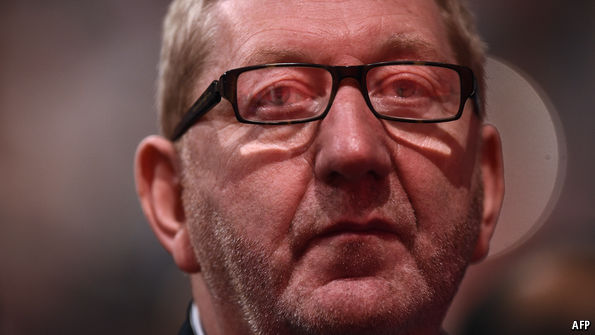THE deformation professionnelle of the British establishment is its habit of rewarding failure: mess things up, get a promotion. The Brexit referendum provided a particularly dispiriting case study of this. Remain was repeatedly out-thought and out-manoeuvred by Leave: there’s no doubt where the brainpower lay. But the leaders of this fiasco were duly garlanded with honours: a CBE for Will Straw, the leader of Stronger In (and the son of a former British foreign secretary, Jack Straw), knighthoods for Craig Oliver and Ed Llewellyn, David Cameron’s point men in Downing Street. The “winners” of the most important political battle in recent British history are mostly now on the margins of British life. Douglas Carswell, who did as much as anybody to make Brexit happen, has decided not to contest his Clacton seat in this election. The “losers” are in clover. Edward Llewellyn, who bears as much responsibility for the failure as anyone, is Britain’s ambassador to France and sits in the House of Lords as baron Llewellyn of Steep (I live a mile away from Steep and have never come across him in any local function).
The left-wing establishment is just as prone to rewarding failure as the conservative establishment. Alan Rusbridger, the editor of the Guardian from 1995 to 2015, left the paper’s finances in what might politely be called “difficulties” with his unconventional business model of boosting spending while giving a lot of stuff away for nothing. He is now head of an Oxford college (Lady Margaret Hall) and chair of the Reuters Institute for the Study of Journalism at Oxford. But even by the standards of Baron Llewellyn and Mr Rusbridger, Mr McCluskey’s re-election to the headship of the Unite union was a shocker.
Unite is a trade union giant with more than a million members and interests in a wide range of industries from financial services to care work. It is also a Labour Party power-broker, providing the party with funds, controlling votes on the National Executive Committee and irrigating its grass roots. The party’s tradition as an alliance between a parliamentary party and a trade-union movement is represented in its purest form in Unite.
Unite’s recent leadership election was the closest thing to a real contest the union has had in years: Mr McCluskey (pictured), running for a third term, faced a strong challenge from Gerard Coyne, a moderate. Mr Coyne did his best to engage grassroots members but in the end apathy and extremism prevailed: Mr McCluskey won with 59,067 votes to Mr Coyne’s 53,544 on a turnout of just over 12%. It is worth noting that Unite suspended Mr Coyne from membership on the last day of his campaign and stripped him of his duties as West Midland regional secretary. Mr McCluskey now remains a trade union baron and Labour Party power-broker by garnering just 6% of the possible vote. Unite is now investigating Mr Coyne for as yet unspecified sins. Keir Hardie would not have been impressed.
McCluskey’s narrow victory is a tragedy for the British left: it condemns Unite to another five years of incompetent leadership while significantly increasing Mr Corbyn’s chances of holding onto the leadership of the Labour Party after losing the general election. It is also a tragedy for the general principle of natural justice. Mr McCluskey has delivered nothing but failure. He backed Ed Miliband rather than David Miliband for the leadership of the Labour Party: without his intervention Labour might well have won the 2015 election and Britain might have been spared the referendum. He backed Jeremy Corbyn to succeed Ed Miliband and kept him in office when it looked as if sense might prevail. Again without Mr McCluskey’s dismal leadership the result of the referendum would probably have been different. All the while his own union withered under him: membership has fallen by half a million since the last election, and Unite has lost its position as Britain’s biggest trade union to Unison.
Mr McCluskey is a creature of a hard-left faction within the left, a parasite that has grown fat by hollowing out the trade union movement and the Labour Party. His chief of staff, Andrew Murray, is a hard-line leftist, a leader of the Stop the War movement that makes a point of protesting all wars except those involving Vladimir Putin, and a close friend of Seumas Milne, Mr Corbyn’s director of strategy and communications. That faction’s recent history is a case study in successful entryism: install weak leaders that you can manipulate; keep internal votes as low as possible; use every opportunity to advance the far-left agenda; and apply one set of rules to yourself and another to everyone else. According to Guido Fawkes, a blogger, Mr McCluskey and his allies, including Mr Milne, celebrated at the Boot and Flogger, a bar where the champagne starts at £51 a bottle.
Condemning the Labour Party to perpetual opposition while the Conservative Party makes the weather; handing power to a hard-left clique that regards Venezuela as a better social model than Sweden; preserving power on the basis of less than 15% of the votes of your members: that is a pretty dismal record. But the biggest charge against Mr McCluskey is that he has betrayed what he would no doubt call “ordinary working class people” at precisely the time when those ordinary working class people require and deserve intelligent and imaginative representation.
Global capitalism is currently undergoing a period of worrying consolidation: super-companies are consolidating their power at the heart of the global economy, reducing competition, cosying up to pliable governments, and making enthusiastic use of tax dodges and financial chicanery. (For anyone who doubts these sweeping generalisations I have documented them in some detail in my special report on the rise of super-companies and their sometimes dubious conduct.)
This is happening at the same time that technological innovation and artificial intelligence are disrupting the labour market on a scale that we haven’t seen since the industrial revolution: service jobs are being Uberised and the professions are about to be subjected to the same fate as the Luddites. This gives the trade union movement a chance to reinvent itself for a new age. It can claim that the balance of global power is shifting dangerously in favour of a new oligarchy. It can claim that the middle-classes are about to discover that they have more in common with the working-classes than they ever imagined. It can claim that pension schemes, labour laws and industrial relations need to be rethought in the light of massive technological change—and that people who sell their labour for a living should take part in such rethinking.
Mr McCluskey has done none of these things. His problem is not just that he’s the instrument of a hard-left clique. It is that he sits on top of a trade union movement that is getting smaller, older and more concentrated in the public sector, and a trade union movement, moreover, that has nothing to say about the profound economic forces that are reshaping global capitalism.




